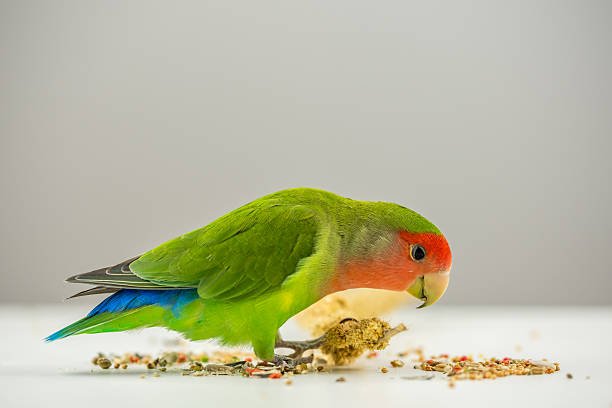What you feed your parrot is probably the most important topic next to safety. Avian experts continue to see poor nutrition as the cause for many serious illnesses, even death, in parrots. In some places it is, sadly, still the general practice to feed parrots a sunflower based seed mix, a generic store-bought pellet, some fruit, and call it good. It is becoming widely understood that a sunflower seed based diet will eventually cause fatty liver disease or other illnesses in parrots. Of course, given the chance, that is what your bird will want to eat, just as a child will pick a candy bar over a healthy dinner.
Avian nutritionalist around the world have been releasing more and more studies on this topic, and the growing consensus is that your parrot needs a variety of fresh vegetables, herbs, soaked and sprouted grains, lentils, seeds and nuts, and a small amount of fruit.
You are going to find a lot of controversy on this topic, even between veterinarians who are maybe not up to date on the latest health studies. You will have to do your own research and come to your own conclusions. This will hopefully be a guide to get you started.
For this article on nutrition lets start with the topic of pellets and chop. We suggest providing a healthy pellet to support the main feeding of vegetables, sprouts and grain diet, or chop. I offer my birds their chop in the morning, then after two hours, I take that away to avoid them eating spoiled food during the day, and replace it with a small dish of pellets to eat. I then take that away and offer another feeding of fresh foods in the late afternoon when parrots in the wild are prone to eat again.
If my parrots seem to not be eating the fresh food, I will reduce the amount of pellets until they do, so there is a balance between the two. The goal is to get them eating vegetables as a regular meal, but it is important that they are getting a large variety of nutrients. Just providing a twig of broccoli and zucchini is not going to cut it. Learn how to make chop for your parrots, so you can be sure to provide them a full range of nutrition.
Stay away from pellet brands that contain copper sulphate. In fact, I recommend research on any brand of pellets that you purchase for your parrot. Do they contain filler such as corn, soy or wheat products which are usually heavily sprayed with pesticides? Try to find one with organic ingredients. Are they heat pressed which can ‘cook’ out nutrients or cold pressed, which retain vital minerals and nutrition? A great brand that I recommend is TOPs Pellets which contain organic ingredients as well as being cold pressed. Marlene Mc’Cohen offers her own signature blend.
Types of foods to avoid giving to your parrot… anything that is bad for humans to start. Surprised? Don’t give your birds potato chips, fried foods like French fries, or foods containing sugar or salt. It is also not advised to give them milk products like ice cream or cheese. Birds do not have the ability to digest lactose. While these products are not initially deadly, they can be harmful over time. Also avoid caffeine and chocolate. Of course your bird will love these things, and being flock oriented creatures, they will want to try anything you are eating. Offer them healthy substitutes like carrots or sugar snap peas, or don’t eat snacks in front of them to curb the temptation.
Providing a healthy diet can create beautiful feathers, a satisfied parrot, and curb potential illnesses or even feather destructive behavior.




